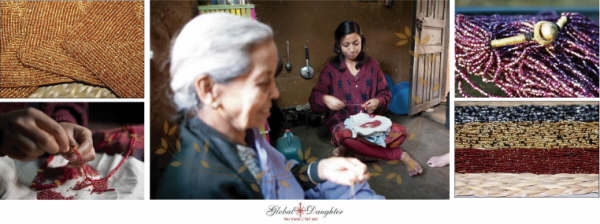The women of the badi community in Nepal are some of the most discriminated in the country. Their fate as bonded sex labourers is cruel and their future in the village is bleak. They are the exact women Global Daughter aims to connect with to create employment or skills training for them and their daughters. The following is an informative article on the Badi experience.
By AMY WALDMAN
New York Times
MUDA, Nepal-- With its simple mud homes, low roofs and string cots, this tiny settlement near the Indian border looks like any other in this part of western Nepal. Only the women suggest something different, garishly painted as they are even in the early morning hours.
They loiter on a slope or around the tea stall, waiting for men, who come, banter, negotiate, then slyly walk one of the women to one of the village houses. The women's children play nearby and watch.
Caste has become destiny for many communities, defining their profession through generations. But few people have inherited so vexed a destiny as the Badis of Nepal. Their profession is prostitution, passed down from one generation to the next.
While many Badi women have left the sex trade, others keep falling into it, driven by hunger, a lack of alternatives and the stigma of being a Badi.
The Badis, who number tens of thousands across western Nepal, are one of 36 castes who make up Nepal's untouchables, said Suk Lal Nepali, a Badi who runs Social Awareness for Education, or SAFE, a nonprofit organization that works with the Badis.
But, he added, "we are untouchable among the untouchables."
Sunni Nepali, now 22, began working as a prostitute four or five years ago. Her body supports 11 relatives, including her parents and two younger brothers. Each encounter she has up to five a day earns her anywhere from 70 cents to $2.15. She loathes the work, she said, but sees no choice. She has no education.
Besides, she asked: "Who's going to marry me? I'm already involved in this."
The Badis did not start out as prostitutes when they migrated to Nepal from India some three centuries ago. They made drums and musical instruments, fished and danced and sang. They would go to the homes of landlords, or zamindars, to entertain at social ceremonies, in return for food.
In time, the zamindars claimed some of the girls as concubines. They would use them, then abandon them when they had children, said Ramesh Nepali, a Badi. Many Badis have taken the surname Nepali to avoid the disgrace of being a Badi.
In this patriarchal society, fatherless children have few rights. It can be difficult to register their births, and thus get them citizenship, school admission, even the right to vote.
Already nonentities in society's eyes, daughters dutifully followed their mothers into prostitution, often encouraged by parents no longer willing or able to work themselves. Badi men lived off the women's work.
Social welfare organizations have tried to coax the women into other jobs with some success, said Suk Lal Nepali, although he noted that even his own sister slipped into prostitution three years ago. He says only 150 women remain in prostitution, down from 587 a decade ago.
Still, the whole population remains stigmatized.
About half of the 50 families that lived in this settlement have migrated to India in search of work as maids or guards, leaving perhaps 250 Badis in Muda. In part, that is a result of pressure from Maoists waging an insurgency against Nepal's constitutional monarchy. They are also against prostitution and have ordered the Badis to stop their work. There is pressure, too, from the government, carried out by the army and the police.
"We can no longer be prostitutes," said Kokali Nepali, 30, a mother of four. "Before, it was accepted, it was open. Now there is pressure from all sides society and government. We cannot do it openly."
In this part of Nepal, however, there is little other work to be found. Even many of the women who have abandoned the sex trade, like Kokali Nepali, live off it, working as educators for SAFE and other groups.
All of the women insist they practice protected sex, and say they have educated many of their customers to do the same. Sunni Nepali even lamented that because she used condoms so reliably, it would be difficult for her to conceive a child to raise on her own, which she wanted.
There have been about 236 total H.I.V. cases identified in the middle and western parts of Nepal, said Dr. G. Raj Shakya, the president of the Nepal S.T.D. and AIDS Research Center in Nepalgunj.
He said he had not identified H.I.V. cases among Badis, but that he was almost sure there were some. Many of the women refused to be tested, he said, for fear that a positive result would further stigmatize them and their community.
The women say the danger is from those who migrate to India, and then come back.
Using the AIDS threat as leverage, the Badis have been seeking government help to move into other lines of work, but without success.
"We are in a position to leave prostitution if the government is ready to announce we are not prostitutes and provide alternatives," Suk Lal Nepali said.
His organization has opened hostels for Badi girls, hoping that a different environment will keep them from following their mothers into the sex trade.
But some girls remain. Kokali Nepali's 7-year-old daughter was around as the women did business. So was Gomati Nepali's 12-year-old, Rabina, who said she wanted to be a nurse.
Gomati Nepali got into prostitution at 15, when her parents were sick, the family poor. She works out of her mother's house.
"In an environment like this," Gomati said of Rabina, "I'm afraid she will go into this."
source: http://www.nytimes.com/2004/04/11/international/asia/11MUDA.html

No comments:
Post a Comment